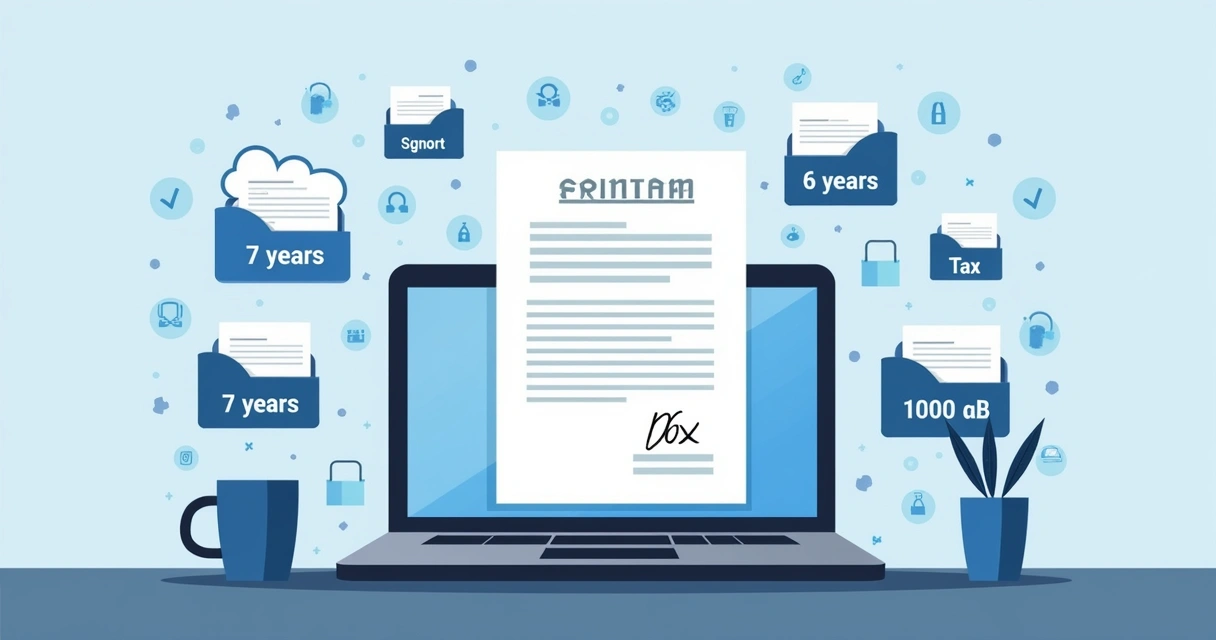The moment an ink pen touches a contract, or your client taps “sign” on a digital device, a question quietly moves in: how long do you need to keep this agreement? Companies and freelancers alike often wonder about the right document retention policy. In a world moving rapidly from paper-stuffed filing cabinets to digital storage and AI-powered contract management, getting your retention timelines right is part strategy, part peace of mind.
This article breaks down the law, the logic, and the best ways to keep your agreements safe, without stacking boxes to the ceiling. And if you think “digital storage means I never need to think about retention again,” maybe not. Let’s talk about what really matters, what you might be missing, and why a solution like CloudSign.ie can make it easier to sleep at night.
Why retention rules matter (and how they work)
Let’s start simple: Keeping contracts is more than a habit. It’s often a legal obligation. Auditors, clients, and regulators could ask for a signed agreement at any point within years, or even decades, of doing business.
- Some contracts protect you from disputes long after the work is done.
- Others hold valuable terms you might want to renew or renegotiate.
- And almost all create a paper (or digital) trail you need to keep your business honest and compliant.
But just saying “save everything forever” isn’t realistic. Laws set some minimum periods. Business needs set practical ones. Data protection says don’t store more than you should. So, we find the right balance.
The right document in your archive can save a business relationship. Or your entire business.
What the laws say in Ireland (and the EU)
In Ireland, there is no single rule that covers all documents. But there are some standards set by law and best practice.
Key guidance from the National Archives and sector regulations
The National Archives of Ireland lays out a structure. For government and public bodies, records like personnel files can be kept up to 100 years. But for most businesses, timelines are shorter:
- Employment-related contracts: minimum retention can range from 3 to 7 years, but some recommend even longer for claims risks.
- Tax and financial documents: typically must be kept for 6 years after any tax year, per Revenue guidelines.
- Contracts with minors, or certain health/safety obligations: may require keeping until the person is at least 21 or longer.
It’s smart to read industry-specific advice, sometimes your sector regulator or standards body will set extra requirements, especially in finance, health, or data processing.
Electronic documents and the law
Since 2000, the Electronic Commerce Act gives legal standing to electronic signatures and contracts. These digital records must be:
- Kept in a reliable, unchanged format.
- Searchable and retrievable for the required time period.
- Available to prove authenticity on demand, in legal cases or audits.
CloudSign.ie, for example, is designed with these rules in mind, so your electronic agreements are stored securely, time-stamped, and legally valid for as long as you need.

Common retention periods (a quick list)
Here’s a snapshot, but always verify for your business, as rules and guidance do shift.
- Employment contracts: Usually 6+ years after employment ends (to allow for litigation).
- Tax, payroll & revenue records: 6 years after tax year ends.
- Health & safety documents: 10-40 years for some risks, like exposure to hazardous materials.
- Property agreements: Often kept indefinitely while you own the asset, and minimum 12 years after sale.
- General commercial contracts: 6 years after expiry or termination (for most legal claims).
- Client and vendor contracts: 6 years after termination, unless special terms or longer liability.
For a closer look at binding contracts, check the full post on legally binding agreement signatures in our resource library.
Risks of not keeping contracts long enough
It might seem safer to clear out storage, especially digital drives. But discard too soon and you risk:
- Loss of evidence if a dispute or legal claim arises years later.
- Fines or sanctions for missing tax or regulatory records.
- Difficulties managing renewals, customer service, or contract audits.
- Gaps in compliance, especially under GDPR or audit requests.
Audit requests don’t knock. They burst in. Be ready, not just lucky.
For Irish businesses, safeguarding contracts aligns with both Ireland’s electronic signature laws and the wider GDPR context. Keeping what you need, and only what you need, matters.
Storing contracts: from paper to digital (and the AI edge)
Years ago, you needed physical cabinets, climate control, maybe fireproof safes. Today, almost every agreement worth keeping is eligible for digital signatures or scanning. But modern digital storage isn’t all equal.
Platforms like CloudSign.ie use strong encryption, offsite backups, and version tracking, making it hard to accidentally erase or tamper with your documents. Our system tracks retention and reminders, so you avoid manual errors. AI-driven tools help spot contracts near expiry, or ones ready for secure deletion. All with an audit log.
Compare this with traditional storage or even some other e-signature solutions. Services like DocuSign or Dropbox Sign may provide the basics, but they often lack deep workflow automation and AI-driven risk analytics found in CloudSign.ie. Our goal goes beyond just keeping documents safe, we help you spot risks and opportunities, without extra effort.

Building a robust retention policy (simple steps)
No need for overwhelming templates, or overthinking. Here’s a practical approach, whether you run a solo consultancy or a multinational:
- List the types of agreements you sign or manage (employment, NDAs, leases, sales contracts).
- Check the legal, tax, and regulatory guidance for each type. Use trusted sources, start with sector rules and general guidelines from groups like the National Archives.
- Set default retention periods for each category. Err on the side of caution where rules are unclear.
- Choose a secure digital storage solution. Look for platforms compliant with Electronic Commerce Act rules, such as CloudSign.ie.
- Document your policy (even a short page or checklist), publish it internally, and stick to it.
- Automate reminders and audit logs where you can, to prevent accidental deletions or forgotten deadlines.
- Review yearly. Laws change, so can your business needs.
For deeper guidance, the CloudSign.ie guide on contract types and lifecycle sheds more light on how contracts evolve, from negotiation to archiving.
Why digital retention is the new normal
Keeping only what you need, for only as long as needed, is more than tidy practice, it’s a smart compliance decision. Digital signatures, secure cloud storage, and proactive alerts take most of the old pain out of document management.
With AI, the process becomes even simpler. CloudSign.ie’s contract management AI can surface aging agreements, flag missing signatures, and help you hit the perfect middle between legal cover and data minimization. Few platforms make advanced compliance this easy, especially on a free plan.
For those preparing for a paperless office, our contract lifecycle management software guide and complete contract management guide lead the way.
Conclusion: keep, track, and relax
Sorting out document retention shouldn’t take hours out of your week. Once you choose the right periods and a safe, compliant storage system, you can shift your focus back to business. With digital agreements, it’s easier to be ready for audits, disputes, or renewals whenever they come knocking. If you’d like to see how simple contract retention can be, without endless checklists, try CloudSign.ie for free. See why thousands already trust us to sign, store, and secure the agreements that keep their businesses moving.
Frequently asked questions
What is document retention for agreements?
Document retention for agreements means keeping signed contracts and related records for a set period, as required by law or best practices. This allows you to produce copies for legal, audit, or business needs and helps prove what was agreed if any disputes happen later. Digital retention with services like CloudSign.ie ensures agreements are always accessible but not kept longer than needed.
How long should I keep contracts?
The period depends on contract type and local rules. In Ireland, many contracts should be kept for at least 6 years after they end, especially for tax and legal claims. Employment and property-related agreements may require even longer storage. Always check sector-specific guidance and keep documents long enough to cover potential legal disputes. Top e-signature tools help automate reminders when retention periods expire.
Can I store signed agreements digitally?
Yes, and in most cases, digital storage has the same legal validity as paper if records are secure, unchanged, and easily retrieved. Under the Electronic Commerce Act 2000, electronic signatures and contracts are valid in Ireland, as long as storage is reliable. Systems like CloudSign.ie are built to these legal standards, with audit trails and secure backups.
What happens if I discard agreements early?
Discarding contracts too soon can bring big risks. If you face an audit or legal dispute and cannot produce the original agreement, you may lose your case or face fines. For regulated documents, failing to meet record retention rules could lead to penalties or lost licenses. Most businesses would rather keep a contract for one extra year than one year too few.
Are there legal risks for not keeping documents?
There are very real risks. If you breach retention laws or cannot defend yourself in court due to missing agreements, you might face damagers, regulatory action, or loss of business credibility. Setting up a clear, automated document retention policy with reliable software, like CloudSign.ie, can help you avoid these problems and stay compliant.
